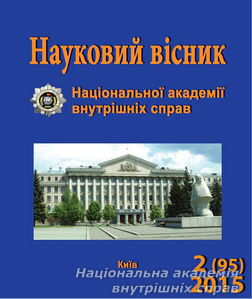The compulsion as a provision of inspection in criminal proceeding
Keywords:
criminal proceedings, investigations, examination, procedural coercion
Abstract
The purpose of this article is to determine the specific problems that may arise during the inspection in a forcible manner and ways to remove it. The inspection – is the investigative (detective) action which is to review the human body for resolving issues that are relevant to the criminal proceeding. According to the Criminal Procedure Code of Ukraine of 2012, the investigator, the prosecutor implement the inspection of the suspect, the witness or the victim in order to identify their body traces of the crime or distinguishing marks if you do not have to carry out the Court medical examination. Legal regulation order of the inspection procedure is flawed because the purpose and objectives of this investigation activity are not clearly defied, the types of inspection and procedural order of proceedings are not clearly stated, the grounds for its holding are not clearly stated in the law, there is no procedural regulation of Procedure of compulsory inspection. This allows the pre-trial investigation authorities to interpret some provisions in the enforcement discretion. According to the Criminal Procedure Code of Ukraine of 2012, the decision to hold the inspection carried out by order of the prosecutor’s resolution and not by the investigator’s as it was before, but by the legal basis of the inspection, under current Criminal Procedure Code is a prosecutor’s resolution. We propose to amend 2 part of Article 241 of Criminal Procedure Code about the possibility of an order of carrying out the inspection not only by the prosecutor but by investigator as well, as required by Code of Criminal Procedures of Belarus, Kazakhstan and Russia. We believe this approach will provide real time savings and effectiveness of caring out the inspection. We also offer to consider the possibility of carrying out the inspection of an individualbefore entering the information into the Unified Register of pre-trial investigations and early pre-trial investigation in criminal proceeding, especially during the preliminary investigation of crimes against committing sexual freedom and sexual inviolability of the person who will lead to more effective crime investigation. In the Criminal Procedure Code of Ukraine of 2012, for the first time, the legislator secured the possibility of carrying out the inspection forcibly in the event of a person’s refusal to pass it voluntarily. We offer the author’s definition of the inspection – it is one of the investigative (search) action, the carrying out of which is aimed at obtaining evidences that are important to investigate crimes and establish the truth in the case. Obtained evidences may not only have the guilty but also have the acquittal nature. Therefore, the objection of the use of the forced inspection to the victim, and in some cases to witness significantly limits the right of a suspect, accused for the defense. The inspection of victim, even in case of his refusal, in some cases is necessary in the investigation of rape, robbery, causing bodily harm and other crimes, especially in cases where there is suspicion of simulation or slander from the victim. To confirm or deny the allegations of the victim about the fact of the crime is possible by his inspection and examining the clothes. We believe that it would be useful to identify common grounds for compulsory inspection for the suspect, victim and witness, despite the difference in their procedural status, thus exhausting all possible convictions of persons for carrying out of this procedural action.Downloads
Download data is not yet available.
Abstract views: 40 PDF Downloads: 289
How to Cite
[1]
Topchiy, V. and Karpenko, N. 1. The compulsion as a provision of inspection in criminal proceeding. Scientific Herald of the National Academy of Internal Affairs. 95, 2 (1), 18-28.
Issue
Section
Combating crimes: theory and practice
- Authors reserve the right to authorship of their own work and transfer to the magazine the right of the first publication of this work under the terms of the Creative Commons Attribution License, which allows other persons to freely distribute published work with mandatory reference to authors of the original work and the first publication of an article in this magazine.
- Authors have the right to enter into separate additional agreements on non-exclusive dissemination of the work in the form in which it was published in the journal (for example, to post an article in the institution's repository or to publish as part of a monograph), provided that the link to the first publication of the work in this journal is maintained.
- The journal's policy allows and encourages the posting of articles by authors on the Internet (for example, in electronic storehouses of institutions or on personal websites), both before the submission of this manuscript to the editorial office and during its editorial processing, as this contributes to the creation of a productive scientific discussion and positively affects the efficiency and dynamics of citing the published work.




